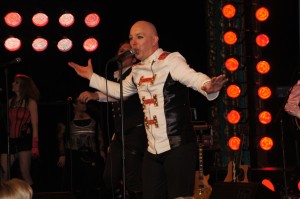 Sal Clemente has been a very busy person for the last ten or so years. Clemente, and his band mate and business partner and friend Alan Ware, co-founded the Ultrasonic Rock Orchestra to bring audiences the excitement of hearing the music of classic rock bands like The Beatles, The Who, Led Zeppelin, and Queen in a live concert setting. The URO eventually became a staple at the Regent Theatre in Arlington, Massachusetts. This Saturday night, The URO will present another of their classic rock concerts at the Arlington theatre. The URO will also present Jesus Chris Superstar in concert at the Regent this November.
Sal Clemente has been a very busy person for the last ten or so years. Clemente, and his band mate and business partner and friend Alan Ware, co-founded the Ultrasonic Rock Orchestra to bring audiences the excitement of hearing the music of classic rock bands like The Beatles, The Who, Led Zeppelin, and Queen in a live concert setting. The URO eventually became a staple at the Regent Theatre in Arlington, Massachusetts. This Saturday night, The URO will present another of their classic rock concerts at the Arlington theatre. The URO will also present Jesus Chris Superstar in concert at the Regent this November.
Clemente was in the middle of working on the show for this Saturday night at the Regent Theater when he paused for this interview. For this Saturday’s concert, Clemente was focusing on how to make this week’s classic rock concert a little bit different from the previous runs. “We decided to really zero on all the biggest songs from the bands that we play,” he said. “We’re not doing as much b-side, oddball stuff we normally do.”
Clemente has planned for the URO’s Jesus Christ Superstar production something entirely different. “That’s a little different animal,” he said. “We’re telling a story and we’re doing material that’s essentially a theater piece. We treat it as a concept rock album theater piece because that’s what it originally was. We base our performance and our production on that. The way we perform it is as the story. In essence, it’s very much a concert performance as well with the band on stage. Nobody’s dressed in robes and sandals.”
URO also adds extra performers to the J.C. Superstar show, a keyboardist and a few singers to make sure they can cover it all. “We have about four extra people on stage with us,” he added.
Clemente and URO have performed JCS only one time in the past, this last Easter weekend at the Norwood Theatre in Norwood, Massachusetts. “We’ve only ever did it in Norwood. The guys from the Regent came and saw it and decided they wanted us to come to the Regent and do it, which we’re really excited about doing.” It will run November 22, 23, 24, Friday through Sunday.
For many years now, Clemente and his URO troops have been focused on the classic rock concerts at the Regent. The productions require a lot of work even before the band sets up its equipment. Auditions, rehearsals, technical plans, and marketing keep Clemente’s plate full year round. His inspiration, though, is easy to grasp.
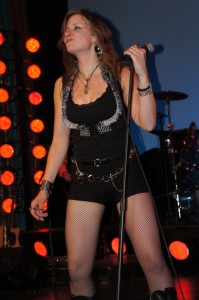 “The main reason is it’s really, really rewarding as a performer to execute material that is pretty difficult to do and do it in the spirit of the original artist,” the singer-guitarist-producer said. “We don’t really try to copy anybody. So, we do think of ourselves as an orchestra. We’re doing the same thing the Boston Symphony is doing. We perform music that no one is ever going to hear the original artist perform live again. Sure, you can see Paul McCartney but it’s not going to see The Beatles. Freddie Mercury is gone. Bonham’s gone. David Bowie doesn’t perform live any more. These artists will very soon all be gone. How does their music stay alive if somebody isn’t performing it and you’re not hearing it in three dimensions? It’s different than putting on a CD. It’s a different experience to hear it live, and it should be heard live. It’s our milieu and our mantra. It’s who we are. We actually are an orchestra. We actually are doing something that’s important, that’s valuable.”
“The main reason is it’s really, really rewarding as a performer to execute material that is pretty difficult to do and do it in the spirit of the original artist,” the singer-guitarist-producer said. “We don’t really try to copy anybody. So, we do think of ourselves as an orchestra. We’re doing the same thing the Boston Symphony is doing. We perform music that no one is ever going to hear the original artist perform live again. Sure, you can see Paul McCartney but it’s not going to see The Beatles. Freddie Mercury is gone. Bonham’s gone. David Bowie doesn’t perform live any more. These artists will very soon all be gone. How does their music stay alive if somebody isn’t performing it and you’re not hearing it in three dimensions? It’s different than putting on a CD. It’s a different experience to hear it live, and it should be heard live. It’s our milieu and our mantra. It’s who we are. We actually are an orchestra. We actually are doing something that’s important, that’s valuable.”
Clemente began his Boston music scene career performing original music when he arrived in the city in 1987 and continued doing that until 2000, until he got tired of trying to write and push original music. So he and URO co-founder Alan Ware, who had struggled alongside him in the indie scene, built a studio and began producing music for film and television.
“When we came on this idea to do the URO, which was based around our recording of Jesus Christ Superstar. It just opened another door for us,” Clemente said. “It was new, fun, and not like being in a cover band.”
Putting on concerts in theaters requires a lot of stamina, to keep rehearsing, auditioning new people, and marketing “It’s an endless job,” he said,” “at our level, which doesn’t really feel that much different than when we were playing the clubs. We play theater and do shows on a different scale than the guys and the girls in the clubs do. We do it all ourselves. We build the sets. We do the lighting. We are the roadies. It’s a lot of work.”
Keeping new people in the band is less of a challenge now-a-days. Current band members have been with the band for a while. “Our turnover isn’t as heavy as it was over the years, with people going to do other things, as far as just life. People might be in bands and be too busy to do it, or get married or move out of town or have a baby.”
Looking for a lot of important qualities in a performer who comes to his auditions, Clemente feels they must have it all.
“That criteria has changed over the year, and it’s become more difficult to find people,” he said. “We’ve learned a lot about what it takes to be in this band. We’ve gone from having 26 people in the band when we first started, and now there’s 12 or 13. We’ve asked each of those people to do more on stage, to be better performers, better musicians, and on top of that, you have to be a person who can get along with everybody else and be responsible, show up to rehearsals and learn your parts. All of those elements are not that easy to come by. Somebody might be a great singer or a great performer but they’re undisciplined or somebody might be super disciplined but they just do not have the skill necessary to do what we need to do.”
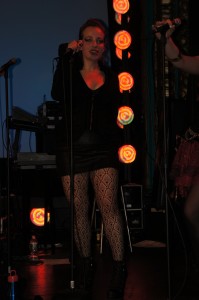 Clemente said they also need to be humble, as nobody gets to do all the lead vocals but must also support in the backing vocals and chorus. “It’s an ensemble, and that’s a tougher thing for people to wrap their heads around. You have to be a certain personality type to be willing to say ‘Ok, this is cool that I get to perform with all these people’ and take pride in the fact that you’re singing not the lead part but it is vital to making the song work. If we do a song like ‘Bohemian Rhapsody’ or ‘Killer Queen’ the backup vocals are a small part of the puzzle, but if that piece of the puzzle’s not there, you won’t get the picture.”
Clemente said they also need to be humble, as nobody gets to do all the lead vocals but must also support in the backing vocals and chorus. “It’s an ensemble, and that’s a tougher thing for people to wrap their heads around. You have to be a certain personality type to be willing to say ‘Ok, this is cool that I get to perform with all these people’ and take pride in the fact that you’re singing not the lead part but it is vital to making the song work. If we do a song like ‘Bohemian Rhapsody’ or ‘Killer Queen’ the backup vocals are a small part of the puzzle, but if that piece of the puzzle’s not there, you won’t get the picture.”
URO usually pack the Regent Theatre in Arlington, and Clemente doesn’t even try to make it sound like their popularity has anything to do with sophisticated marketing strategies. “For us, it’s more about word of mouth. We don’t have the kind of budget to allow us to hire a P.R. firm and do advertising,” he said. “In this day and age, I don’t even know how you do that effectively. Media is so fragmented. Do you pay for advertising on radio or the paper or whatever. It’s hard to tell what works and what doesn’t work..”
Clemente said that dedicated fans usually bring new people to see their shows and those new people become fans. “So far, we’ve been able to make it work that way,” he said, “even through the really bad economy the last couple of years. Now that it’s picking up a little bit, maybe we’ll be able to expand and do some other things, but we’ve been grateful we’ve been able to survive the down turn.”
This whole URO in concert rock opera project began when Clemente and long time band mate Alan Ware opened up a sound studio to produce music for film and television.
“Alan and I had a studio and we were actually making short films,” he began. “We got a little bit of national attention with a few short films we made, placed in a few contests. This was back when digital filmmaking was just coming into it’s own. We didn’t know much about how to shoot a film, but what we knew was how to make the music and the sound really good. What we discovered was it’s a huge part of why a film comes across well.”
Clemente and Ware decided to record a new album version of Jesus Chris Superstar and reinterpret it in a modern way. They intended to film themselves and their cast of players and singers in the process of making the record. Their concert film involved over 30 professional musicians. The Regent Theatre agreed to host the concert and there was a buzz surrounding it. A lengthy Boston Globe article reached the attention of Andrew Lloyd Webber’s company who called to tell him he couldn’t do it, calling on the day the show was scheduled to open, after tickets had been sold and an audience was expected.
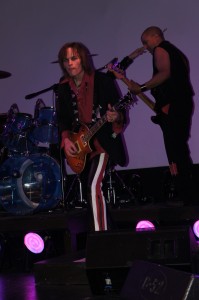 “Even though I had been in contact with them probably a dozen times over the previous eight months about the whole thing,” he recounted. Losing the copyright permission forced Clemente and his partner to change the material to classic rock songs from the same time period of the 1968 Jesus Christ Superstar album. Queen, The Who, David Bowie, and other rock albums that could have qualified as rock operas became the grist for the new plan.
“Even though I had been in contact with them probably a dozen times over the previous eight months about the whole thing,” he recounted. Losing the copyright permission forced Clemente and his partner to change the material to classic rock songs from the same time period of the 1968 Jesus Christ Superstar album. Queen, The Who, David Bowie, and other rock albums that could have qualified as rock operas became the grist for the new plan.
“The rights issues are really complicated,” Clemente said. “It’s no problem making a record of someone else’s material. It’s a very simple process. You just pay the mechanical royalty, boom you’re done. You can record anybody’s music. You can’t bastardize it. But if you’re doing a pretty faithful rendition or an adaptation that keeps all the lyrics intact and all the melodies, then you can do it. If you want to put that on film, that’s a whole different set of rights. The people who control the music control whether you can do it or not. So what happened was, even though I’d been in touch with them several times, it only obviously became real to them when it was in the Boston Globe. It was at that point that they yanked the rug out from under us, and we were no longer able to put the music on the film. But we still had something to do. We still had people depending on us to do the show. When we did the show, the response from the audience was so amazing we just said, ‘Well, we should do this again’ and that’s how it all got started.”
Many of the names involved in each URO production are usually people from the greater-Boston indie-originals rock scene. Christie Beaulieu, Emily Belastock, Matt Sullivan, Ernie Cataldo, and many others who have graced the URO concerts are known quantities on the Boston music scene. Clemente said that people are no longer as territorial about bands like they were in the 1980s and hency they don’t mind working on other projects.
“It’s a small community. Boston’s got a big city reputation, but you can walk across it in a day,” he said. “In the music community, everybody knows everybody else. If they like what we do, and they’re into the music, and they want to audition, we love to audition people. If they’re in bands, and they’re professional about their approach, we’re happy to have them.”
Clemente gets personally enthusiastic and excited about rock operas and the classic rock bands whose songs he and the URO perform. Partly, it’s because it is what he grew up listening to. The material Clemente and URO focus on came out slightly before his time in the music industry.
“I was raiding my parents’ record collection, ‘Sgt. Pepper’ and ‘Jesus Christ Superstar,’” he said. “Any art form is frozen in time. If you think about ballet, ballet is frozen in time now. When you go see ‘Swan Lake’ by Boston Ballet, which they do every year, or, ‘The Nutcracker,’ you’re seeing an art form frozen at its peak. To me, once you hit Sgt. Peppers and you hit Night At The Opera, and you hit Who’s Next, you hit the art form at it’s peak. Everything that’s come after that is built upon those things. So even though Nirvana’s great and there’s great records that have come after that, to me, that’s not the music that’s going to be played a hundred years from now. When somebody decides to go listen to a rock show, they’re going to hear The Beatles. They’re going to hear Queen. They’re going to hear The Who. They’re going to hear Led Zeppelin. And that’s not a dig or insult on the people writing and performing music now. At some point, there’s a peak to an art form, and that’s what happens. If you think about it, it’s like that with everything. If you go to the symphony, you’re going to hear Beethoven, you’re going to hear Bach because that’s the pinnacle of the art form. Even though people now are composing classical music, there’s just never going to be that same impact as the first time you put on Sgt. Peppers.”
It takes a lot to give up a career in original rock to perform orchestrated versions of other people’s music. But, it was a choice Clemente had to make when he was a bit younger. He, Ware, and their bass player Doug Crawford had been struggling to get as much attention as they could back in the day.
“The main band that we played in, Alan, Doug, and I was called the Ultrasonics,” he said. “We performed where Church is now, it used to be the Linwood. We played all the places in Somerville, Club Three, and places in Boston, The Rat and The Channel. We played where everybody played. We made a couple of records, and we banged around, and we did our best, and I think some people really liked us. But, it’s a tough row to hoe. Do you get that radio support you need or do you get the in-crowd to really buy into what you’re doing? And we were always a little too funky or too something to really click with that scene. We were never asked to be in the Rumble or anything like that. But we did our best and we had a lot of fun, and we worked really hard. But eventually, it’s like a shark. You have to keep moving. You have to try something different in order to grow.”
URO often include their original song “Child, Thy Name Is Rock” into their show. Clemente said his band would like to eventually play a full set of original music that he hopes goes over well. “You have to have songs that live up to that level, so were working really hard to try to put something together that will really work for people, work in terms of what they expect from URO,” he said.
Clemente has been blessed to have his wife Darcie and his daughter Maria also helping out with URO.
“My kids are seeing their father who hasn’t given up on what he wants to do and is following his dream and showing them that that’s OK,” he said. “To have Darcy involved and have her be a person who supports the band and what I do a thousand percent, it’s beyond value. There’s no words to describe what that means to you as an artist. In this country, it’s not like artists are looked on as particularly valuable. I think it’s odd. Because if anybody were to think about it for two minutes, they don’t go without some kind of art in their life. Whether it’s listening to music or watching a show they like or reading a book or looking at a picture. Art is everywhere, and it’s value is intrinsic. There’s not a day that goes by that we don’t need it. But at the same time artists are looked upon as second class citizens in this country. For the vast majority of us, it’s not profitable. Profit is the god in this country.”
Clemente also counts himself lucky to have guys like Ware and Crawford by his side during the preparations and performances. The UK born Ware is Clemente’s co-founder as well as his personal friend and band mate. Working with Ware over the years has forged a band between them.
“He’s great. He’s great at a lot of things I’m not, and I’m pretty good at some of things he’s not good at. So, we’re like a great marriage. We compliment each other in great ways. We’re level headed, logical guys who don’t get too hot or too cold. We just want to do the work.” Clemente had equal praise for Crawford, who he described as a very solid guy and tremendous musician.
In recent years, Clemente and the URO have incorporated special guest stars into their concerts. A bagpipe ensemble, a local high school drama club, and a finalist from American Idol have, at times, joined the URO on stage to add additional spark to individual shows.
“They’re mostly because we know the people,” he said. “Alan is Siobhan Magnus’s uncle. The kids from Arlington Catholic, we’ve met them through the Regent. It’s fun. It’s fun for the audience. It gives the audience something different to see.” The bag pipe leader is the father of one of the performers, and he will be back this Saturday night to perform on AC/DC’s “Long Way To The Top.”
Clemente is a hard driving man and a speed demon who shows no signs of slowing down his URO projects in the foreseeable future. “We’re plugging away and we intend to be around for a long time and as long as people will come and see us, we’ll keep playing,” Clemente said.

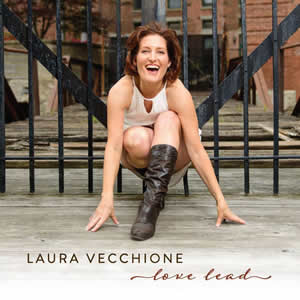
[…] Sal Clemente continues producing his amazing Ultrasonic Rock … window.fbAsyncInit = function() { FB.init({ appId : '567631096615601', // App ID status : true, // check login status cookie : true, // enable cookies to allow the server to access the session xfbml : true // parse XFBML }); // Additional initialization code here }; // Load the SDK Asynchronously (function(d){ var js, id = 'facebook-jssdk', ref = d.getElementsByTagName('script')[0]; if (d.getElementById(id)) {return;} js = d.createElement('script'); js.id = id; js.async = true; js.src = "//connect.facebook.net/en_US/all.js"; ref.parentNode.insertBefore(js, ref); }(document)) […]